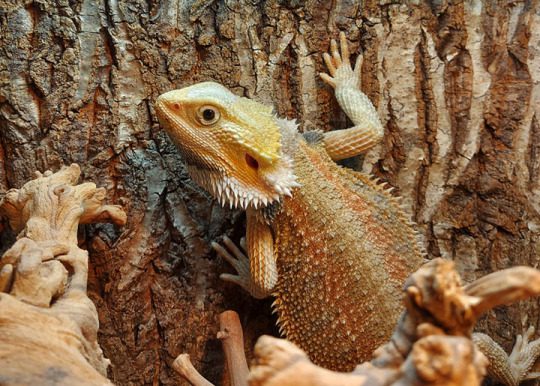Bearded dragons are a fascinating species of lizard that make for popular pets. Their unique behaviors and physical attributes draw in reptile enthusiasts from all over. One of the most commonly asked questions about bearded dragons is whether they are nocturnal or diurnal. The answer provides key insight into their natural behaviors and how to properly care for them in captivity. In this article, we will examine in detail the sleep cycles and activity patterns of bearded dragons to definitively answer whether are bearded dragons nocturnal or diurnal.
The Sleep Cycle of Bearded Dragons

To understand whether bearded dragons are nocturnal or diurnal, we must first look at their natural sleep cycles in the wild. Bearded dragons are native to Australia, where they have adapted to the harsh, desert-like climate. During the daytime hours, ambient temperatures can soar well over 100°F. To avoid overheating, bearded dragons take shelter in burrows and crevices to sleep during the hottest parts of the day. As evening approaches and temperatures start to drop, bearded dragons emerge to bask and become active. However, they tend to sleep much of the night as well to conserve energy.
So in essence, bearded dragons demonstrate a cyclical sleep pattern. They are generally inactive during the intense daytime heat. In the evening when it cools down, they become active for several hours to hunt and forage. Then they sleep for much of the night before emerging again in the early morning. Their days are characterized by two distinct active periods in the morning and evening, with sleep in between during the peak daytime and nighttime hours. This crepuscular pattern of activity aligns closely with their diurnal nature.
Diurnal Nature of Bearded Dragons
Crepuscular activity cycles point strongly to bearded dragons being diurnal rather than nocturnal. Diurnal animals are most active during the daytime and get most of their sleep at night. Although bearded dragons doze a fair amount at night, their peak activity levels occur during daylight hours when they do all their hunting and basking. In the wild, bearded dragons spend nearly all their waking hours engaged in daytime behaviors like:
- Basking in the sun to warm their bodies
- Foraging for food such as insects, small lizards and vegetation
- Establishing social hierarchies
- Excavating burrows and lookout posts
- Marking territory
- Mating rituals
Very little activity occurs at night aside from some intermittent hunting. Being diurnal matches their natural sleep patterns and enables them to effectively thermoregulate, hunt, and engage in species-specific social behaviors. Additionally, their photoreceptive eyes are adapted for daytime vision. For these reasons, bearded dragons are definitively diurnal rather than nocturnal creatures.
Considerations for Pet Bearded Dragons
The diurnal nature of bearded dragons is an important consideration for their care as pets. Owners should provide lighting and heating that mimics natural daylight cycles. This includes providing very bright overhead UVB and basking lights that are turned on in the morning and shut off at night. Nighttime ambient and tank temperatures should be allowed to fall to mimic natural conditions.
Feeding schedules should also be coordinated with their active daytime hours. live prey items like crickets and worms should be offered in the morning and afternoon when dragons are alert and eager to hunt. Plant-based greens and vegetables can be provided midday as well. Owners should avoid disturbing dragons excessively at night since their nocturnal sleep is important.
Adjusting the tank environment and routines to the bearded dragon’s diurnal biology will help support their health, feeding, and activity levels. Accommodating their natural sleep and wake cycles is key to their wellbeing.
Conclusion
In summary, bearded dragons are definitively diurnal lizards rather than nocturnal ones. Their cyclical daily sleep pattern demonstrates crepuscular tendencies, with peak activity occurring in mornings and evenings and rest during midday and nighttime hours. Nearly all hunting, feeding, basking, socializing, and territorial behaviors take place during daylight hours. Their adaptations are specifically tailored by evolution for daytime living. Bearded dragon owners can best care for their pets by providing a diurnal-focused environment and routine. Understanding a bearded dragon’s biology provides critical insights into proper husbandry for these amazing diurnal lizards.
FAQs About are Bearded Dragons Nocturnal or Diurnal
Do bearded dragons require special lighting for their activity patterns?
Yes, bearded dragons need access to proper lighting, including UVB and heat lamps, to replicate natural daylight conditions. This lighting is essential for their health, metabolism, and overall well-being.
Can bearded dragons see in the dark, like nocturnal animals?
Bearded dragons have limited night vision, but they are not adapted for full darkness like nocturnal animals. They rely on diurnal vision primarily and may become less active or more cautious in low light.
How do bearded dragons behave at night compared to during the day?
At night, bearded dragons tend to be less active and may rest or sleep. They become quieter and reduce their movement compared to their daytime activity levels.
Are there exceptions where bearded dragons may exhibit nocturnal behavior?
Generally, bearded dragons are diurnal, but individual behavior can vary. Some may become slightly more active during dusk or dawn, but true nocturnal behavior is rare in this species.
Do bearded dragons change their activity patterns as they age?
Bearded dragons tend to maintain their diurnal behavior throughout their lives. However, their activity levels may decrease with age, and they may become less active in their enclosure.
How can I ensure my bearded dragon’s well-being based on its diurnal nature?
To ensure your bearded dragon’s well-being, provide a suitable habitat with proper lighting, temperature, and a balanced diet. Offer regular opportunities for basking and ensure a consistent day-night cycle to support their natural behavior and health.



